Rajlukshmee Debee Bhattacharya is an Indian poet, translator and literary critic writing in Bengali and English. She won First Prize at the All India Poetry Competition in 1991 organized by The Poetry Society (India) in collaboration with the British Council. [1]
Rajlukshmee Debee Bhattacharya was born in 1927. She taught at the Indian Institute of Technology, Kharagpur and Fergusson College, Pune. She was also a Professor of Philosophy at Nowrosjee Wadia College. [2]
She is the author of The Owl and Other Poems and The Touch Me Not Girl. Her translation works are unique works of transcreation, and her translations include the songs of Rabindranath Tagore. [3] [4]
Rajlukshmee Debee was All India Poetry Prize winner in 1991 for her poem Punarnava (‘’The Ever Renewing’’). Rajlukshmee was also on the Jury for the first ever All India Poetry Competition for School Children held in 1996. [5]
Books
Articles
Indian poetry and Indian literature in general, has a long history dating back to Vedic times. They were written in various Indian languages such as Vedic Sanskrit, Classical Sanskrit, Ancient Meitei, Modern Meitei, Telugu, Tamil, Odia, Maithili, Kannada, Bengali, Assamese, Hindi, Marathi and Urdu among other prominent languages. Poetry in foreign languages such as English also has a strong influence on Indian poetry. The poetry reflects diverse spiritual traditions within India. In particular, many Indian poets have been inspired by mystical experiences. Poetry is the oldest form of literature and has a rich written and oral tradition.
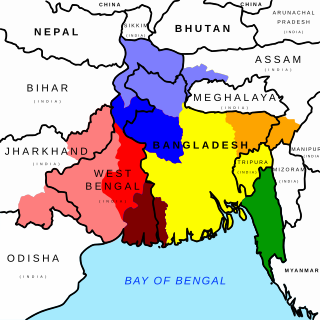
Bengali music comprises a long tradition of religious and secular song-writing over a period of almost a millennium. Composed with lyrics in the Bengali language, Bengali music spans a wide variety of styles.
Gitanjali is a collection of poems by the Bengali poet Rabindranath Tagore. Tagore received the Nobel Prize for Literature in 1913, for its English translation, Song Offerings, making him the first non-European and the first Asian & the only Indian to receive this honour.
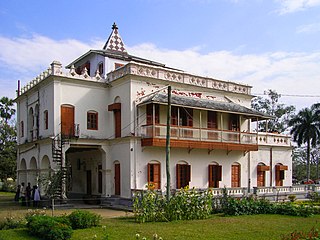
The works of Rabindranath Tagore consist of poems, novels, short stories, dramas, paintings, drawings, and music that Bengali poet and Brahmo philosopher Rabindranath Tagore created over his lifetime.
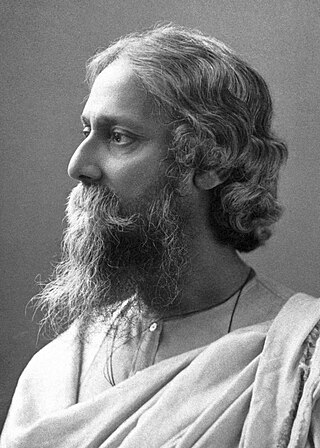
Bengali literature denotes the body of writings in the Bengali language and which covers Old Bengali, Middle Bengali and Modern Bengali with the changes through the passage of time and dynastic patronization or non-patronization. Bengali has developed over the course of roughly 1,400 years. If the emergence of the Bengali literature supposes to date back to roughly 650 AD, the development of Bengali literature claims to be 1600 years old. The earliest extant work in Bengali literature is the Charyapada, a collection of Buddhist mystic songs in Old Bengali dating back to the 10th and 11th centuries. The timeline of Bengali literature is divided into three periods: ancient (650–1200), medieval (1200–1800) and modern. Medieval Bengali literature consists of various poetic genres, including Hindu religious scriptures, Islamic epics, Vaishnava texts, translations of Arabic, Persian and Sanskrit texts, and secular texts by Muslim poets. Novels were introduced in the mid-19th century. Nobel laureate Rabindranath Tagore is the best known figure of Bengali literature to the world. Kazi Nazrul Islam, notable for his activism and anti-British literature, was described as the Rebel Poet and is now recognised as the National poet of Bangladesh.

Rabindranath Tagore is a 1961 Indian documentary film written and directed by Satyajit Ray about the life and works of noted Bengali author Rabindranath Tagore. Ray started working on the documentary in early 1958. Shot in black-and-white, the finished film was released during the birth centenary year of Rabindranath Tagore, who was born on 7 May 1861. Ray avoided the controversial aspects of Tagore's life in order to make it as an official portrait of the poet. Though Tagore was known as a poet, Ray did not use any of Tagore's poetry as he was not happy with the English translation and believed that "it would not make the right impression if recited" and people would not consider Tagore "a very great poet," based on those translations. Satyajit Ray has been reported to have said about the documentary Rabindranath Tagore in his biography Satyajit Ray: The Inner Eye by W. Andrew Robinson that, "Ten or twelve minutes of it are among the most moving and powerful things that I have produced."

Rabindranath Tagore was a Bengali poet, writer, playwright, composer, philosopher, social reformer, and painter of the Bengal Renaissance. He reshaped Bengali literature and music as well as Indian art with Contextual Modernism in the late 19th and early 20th centuries. Author of the "profoundly sensitive, fresh and beautiful" poetry of Gitanjali, in 1913 Tagore became the first non-European and the first lyricist to win the Nobel Prize in Literature. Tagore's poetic songs were viewed as spiritual and mercurial; where his elegant prose and magical poetry were widely popular in the Indian subcontinent. He was a fellow of the Royal Asiatic Society. Referred to as "the Bard of Bengal", Tagore was known by the sobriquets Gurudeb, Kobiguru, and Biswokobi.
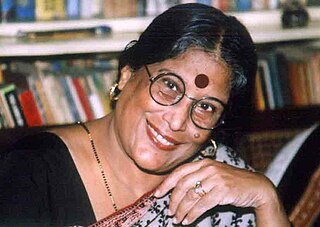
Nabaneeta Dev Sen was an Indian writer and academic. After studying arts and comparative literature, she moved to the US where she studied further. She returned to India and taught at several universities and institutes as well as serving in various positions in literary institutes. She published more than 80 books in Bengali: poetry, novels, short stories, plays, literary criticism, personal essays, travelogues, humour writing, translations and children's literature. She was awarded the Padma Shri in 2000 and the Sahitya Akademi Award in 1999.

Joe Winter is a British poet, literary critic and translator of poetry. A recent long poem is At the Tate Modern. His translations of the Bengali poets Rabindranath Tagore and Jibanananda Das are published by Carcanet Press, and his versions in modern English of the Anglo-Saxon epic Beowulf and the Middle English poem Pearl are with Sussex Academic Press. SAP has also published Two Loves I Have: a new reading of Shakespeare’s Sonnets and Hide Fox, and All After: What lies concealed in Shakespeare's 'Hamlet'?

Song Offerings is a volume of lyrics by Bengali poet Rabindranath Tagore, rendered into English by the poet himself, for which he was awarded the 1913 Nobel Prize in Literature.

Prabasi was a monthly Bengali language literary magazine edited by Ramananda Chatterjee.
The Poetry Society (India) was formed in July 1984 at New Delhi as a voluntary association to promote Indian poetry and to look after the interests of Indian Poets. The founding members included the Indian poets Keshav Malik, J P Das, H K Kaul and Lakshmi Kannan. The Society conducts seminars, creative writing workshops, reading and publication of poetry journal and anthologies. It also conducts All India Poetry Competitions, including competitions among school children.

Chinmoy Guha is Professor Emeritus at the University of Calcutta, a Bengali essayist and translator, and a scholar of French language and literature. He has served as the Vice-Chancellor of Rabindra Bharati University and Director of Publications, Embassy of France, New Delhi. Earlier he taught English at Vijaygarh Jyotish Ray College in Kolkata for more than two decades, and French at the Alliance Française and the Ramakrishna Mission Institute of Culture for eleven and five years respectively.
Ketaki Kushari Dyson is a Bengali-born poet, novelist, playwright, translator and critic, diaspora writer and scholar. Born and educated in Calcutta (Kolkata), India, she has lived most of her adult life near Oxford. She writes in Bengali and English, on topics as wide-ranging as Bengal, England, the various diaspora, feminism and women's issues, cultural assimilation, multiculturalism, gastronomy, social and political topics.
Martin Kämpchen is an author, translator, journalist and social worker.
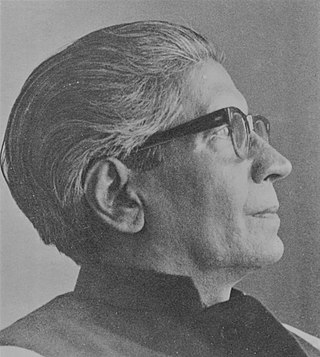
Abu Sayeed Ayyub was an Indian philosopher, teacher, literary critic and writer in both Bengali and English. Though born into a traditional, Urdu-speaking, Muslim family in Calcutta (Kolkata), he was so deeply captivated in his early teenage by the poems of the Indian Nobel Laureate Rabindranath Tagore that he taught himself Bengali so as to appreciate Tagore better. Later, when he started to write, it was mostly in his adopted language, Bengali. During the initial part of his writing career, Ayyub wrote on aesthetics, religion and socialism. However, it was his philosophical and scientific analysis of creative literature - in particular the poetry and the drama of Tagore - that finally brought him wide recognition as "one of the most serious and original Tagore scholars". Ayyub is also credited with "co-editing the first anthology of modern Bengali poetry". He taught philosophy at the University of Calcutta, the Visva-Bharati University and the University of Melbourne, and edited the literary and philosophical journal Quest.
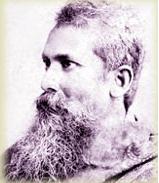
Dwijendranath Tagore was an Indian poet, song composer, philosopher, mathematician and painter. He was one of the pioneers of shorthand and notation in Bengali script. He was the eldest son of Debendranath Tagore and the eldest brother of Rabindranath Tagore.

The 1913 Nobel Prize in Literature was awarded to the Bengali polymath Rabindranath Tagore (1861–1941) "because of his profoundly sensitive, fresh and beautiful verse, by which, with consummate skill, he has made his poetic thought, expressed in his own English words, a part of the literature of the West." He is the first and remains only the Indian recipient of the prize. The award stemmed from the idealistic and accessible nature of a small body of translated material, including the translated Gitanjali.
Bashabi Fraser is an Indian-born Scottish academic, editor, translator, and writer. She is a Professor Emerita of English and Creative Writing at Edinburgh Napier University and an Honorary Fellow at the Centre for South Asian Studies at the University of Edinburgh and an Honorary Fellow of the Association of Literary Studies (ALS), Scotland, and a former Royal Literary Fund Fellow. She has authored and edited 23 books, published several articles and chapters, both academic and creative and as a poet.
All India Poetry Prize was instituted by Poetry Society of India in 1988. The prizes are awarded to the best single work of poetry submitted by an Indian poet. The number of prizes varies from year to year.